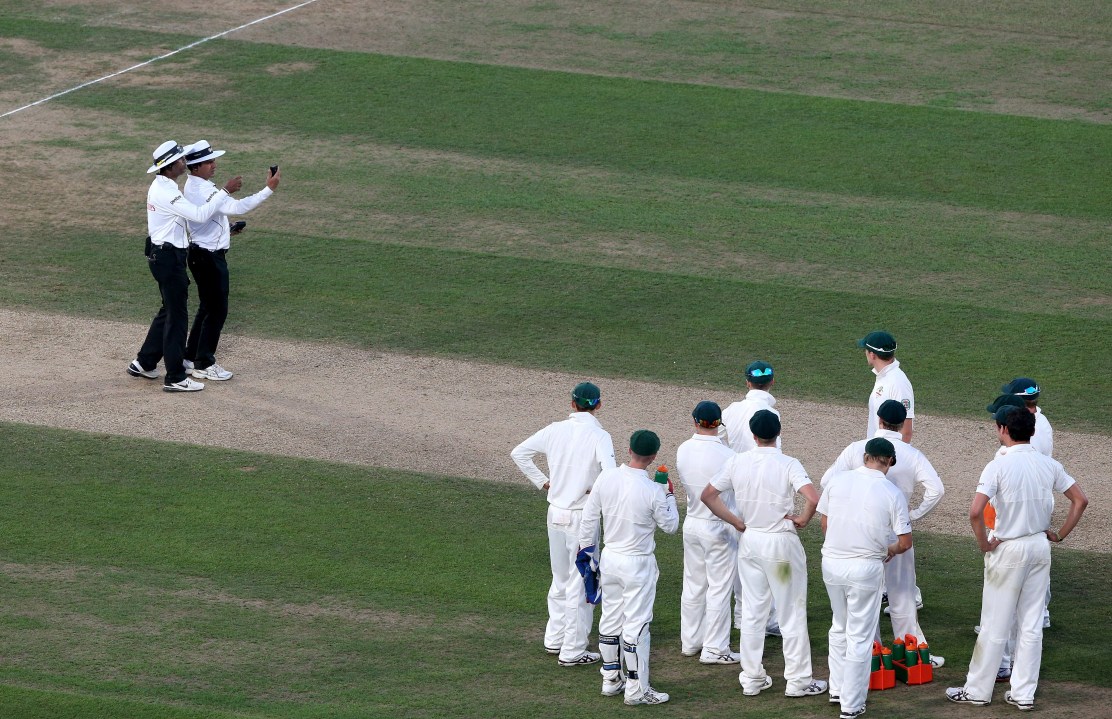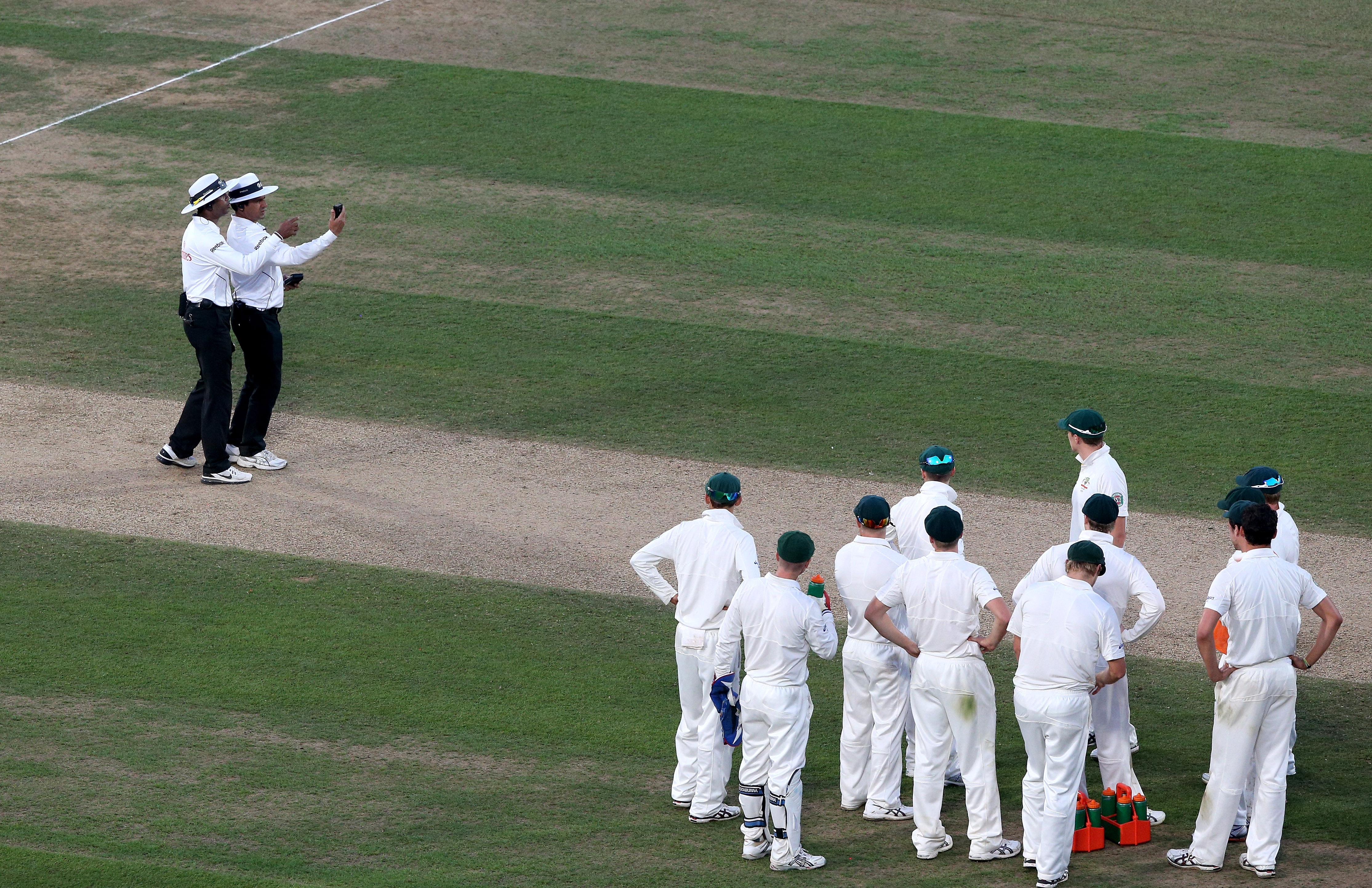It was pretty dark. Darker, in fact, than it had been when the players were hauled off for bad light earlier in the test. Darker, too, than it had been in Manchester when Michael Clarke objected to the umpire’s decision to halt play on account of the light.
But so what? Was there any evidence that continuing to play would constitute an “obvious and foreseeable risk to the safety of any player or umpire, so that it would be unreasonable or dangerous for play to take place”? That is what the laws demand; it remains a mystery why this is not the standard umpires actually use.
The England batsmen did not think conditions dangerous. We have all seen test cricket played in murkier conditions than those pertaining in south London last night. So while it might have been difficult for Australia’s fielders to see the ball that’s not the same as it being dangerous for play to continue. Nearly 25,000 people had paid £85 each to be present for the series finale; they, like the millions watching at home or listening on the wireless, deserved better.
Of course England would have behaved as shabbily “professionally” as Australia. One sometimes fancies that the difference between the amateur and the professional is that the former seeks any excuse to play whereas the latter thirsts for any reason not to play cricket.
And of course if England – or Australia – had bowled their overs at a sensible, non-soporific rate then none of this light-related nonsense would have been necessary. This, however, is something that does not appear to trouble the International Cricket Council. Despite heavy competition from the UCI, IRB, FIFA and many other the ICC may still be the most incompetent ruling body in all sport. It definitely belongs in the conversation.
To recap: the umpires curtailed yesterday’s play with England requiring another 22 runs to win and with four overs left to be bowled. Apparently “fairness” demands the umpires act “consistently” and since they had come off when it was equally dark earlier in the test they had to come off now. There is no great virtue in being consistent if that means being consistently wrong. Context matters. Even if they were right to come off earlier in the test coming off with just four overs remaining is a nonsense. And a disgrace. What about treating spectators with some measure of “fairness”? It is telling that this is never something the authorities think worth caring about.
It could, I suppose, have been worse. It is important to remember that if the series had been tied 1-1 and had England been 22 runs short of victory and Australia two wickets away from winning themselves then exactly the same thing would have happened. Even if all four results had been possible entering the last 20 minutes play of the 25th day of the series and even if the Ashes’ destination was still in doubt the umpires – slavishly adhering to ICC regulations – would have done the same thing. More than their jobs are worth to apply some common sense – or brainpower or courage – to the situation, you see?
And yet – irony klaxon! – a draw was the fairest result for this particular test match. The “right” result was reached by all the “wrong” ways. How very cricket. England had not really done enough, despite Kevin Pietersen’s fifth day pyrotechnics, to earn a victory the chance of which they owed almost entirely to Michael Clarke’s desperate, last-ditch, generosity.
So a 3-0 victory feels about right. It has been a rum series. Trent Bridge set a standard of improbable thrills that, as we half-suspected at the time, would be hard to follow. That proved the case even if there was plenty to cheer at Lords and Chester-le-Street too. At least there was if you were English.
Despite this, England were rarely at their best. It is a measure of their strength – and of Australian weakness – that England won comfortably without significant contributions from Alastair Cook, Jonathan Trott and Matt Prior. If ever a series proved that batsmen set up or save matches but bowlers win them this was it: Ian Bell saved England time and again but Jimmy Anderson, Graeme Swann and Stuart Broad won tests for the men in blue caps.
Australia will reflect that bad weather twice hampered their hopes for victory. They had the advantage of batting first on the two best strips – at Manchester and the Oval – and yet could not force a victory on either. Indeed, four times this series Australia held a first innings lead. Paradoxically, this highlights the weakness of the Australian batting: they were never good enough to capitalise upon this half-time advantage.
Like New Zealand this Australian side are good enough to get into winning positions but not good enough to win from those positions. They are good cricketers but their batsmen – Clarke excepted – lack the consistency required to thrive in a five test series. They can each be expected to have one great day a series but no more than that.
Which is tough luck on Ryan Harris and Peter Siddle. They have bowled splendidly this summer (and been lent under-valued support by Nathan Lyon). But it has not been enough, not nearly enough. They have kept Australia competitive but come crunch time Australia were always at a disadvantage.
The problem for the Australians is that, collectively, they played closer to the ceilings of their ability than England did to theirs. There is more – much more – to come from this England batting order. Can one confidently say the same about the Australians? I am not sure we can.
That’s nine tests without a victory for Australia; twelve without a defeat for England. Cook’s side is a fine but not great one; Clarke’s is still a team in search of an identity. The problem for Australia is that Clarke’s XI is only the sum of its parts.
Mark this, however: Australia will win at least one test this winter. The laws of probability make it unlikely these two sides can meet ten times in seven months without the antipodeans prevailing at least once. England will have a bad test or Australia an extremely good one. It happens.
If Australia need to pick a side and stick with it – players need to know they are wanted – England still have some questions to answer themselves. What happens if Swann, Prior or Pietersen are injured? Who bats at 6? Is Joe Root ready to open in Australia? Who are the third and fourth seamers? This England side is not quite as settled as it sometimes seems.
Still, these are the kinds of question most teams face. They are not so daunting as to cripple England’s tilt at retaining the little urn this winter.
This has been a curate’s egg of a series in which there is the odd sense that perhaps the more likeable team has been beaten pretty thoroughly. Even stout England supporters should have felt pleased for silicon-padded Shane Watson’s long-overdue century, for instance. There’s no need to feel sorry – or, worse, pity – for the Australians for their time will come again. They were the underdogs in this series and played like it.
Back-to-back Ashes series seemed like overkill when the schedule was announced. Now it seems quite appropriate. The story ain’t over yet. This is an Australian side learning who it is. There are signs of improvement, signs that on their day they could be formidable. (The question being, as before, how many of those days there will be). Meanwhile, England are solid but not perhaps quite as good as they think they are. Brilliant individual performances saved the English collective in this series. They are not a team in transition but nor are they quite a team going anywhere. Not as good as South Africa but better than everyone else England find themselves in some kind of odd and weightless limbo.
It’s odd: England defeat the old enemy 3-0 and it’s just a little underwhelming. What a strange thought that is.








Comments